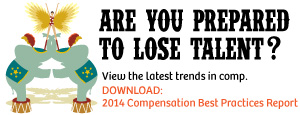It’s no secret by now that crowdsourcing in the workplace is one of the easiest, cheapest and most effective ways to increase employee engagement. HR consultants and bloggers talk a lot about ways that HR practitioners can incorporate crowdsourcing into their workplaces, but what isn’t talked about much is what employees do and don’t want in terms of crowdsourcing, how they receive and internally process crowdsourcing opportunities and what about the crowdsourcing makes them more engaged. I recently had the chance to talk with several employees in various positions and leadership levels about their take on the issue and am happy to share some insight from their point of view for a change.
Take a look at these trends that came up almost across the board when it came to what employees wish you knew:
We appreciate that you care to ask
Overall, employees like that you care what they think about workplace issues. They do have reservations about how crowdsourcing is handled (more to come on that) but are appreciative of the fact that you wish to involve them in decision making, especially when it will directly affect them. This is probably no surprise as most of us desire to have some control or say in matters that affect us, but it really does go a long way at work since the majority of people are accustomed to decisions being made behind the scenes and finding out after the fact.
Asking our opinion doesn’t fix or make us forget things
While the overall feeling seems to be that employees absolutely appreciate the fact that you seek out their opinions or recommendations, it’s important to note that a single instance of crowdsourcing does not change the company’s culture or make them forget about the recurring trend of finding out about major decisions after they’ve been made. If HR professionals want to utilize crowdsourcing to engage employees, consider the current company culture and overall perception of employees. For some, it may feel that embracing a culture of crowdsourcing is as easy as changing the direction of a fishing boat, while to others it may seem like turning the Titanic. Above all, be realistic about how much the engagement level will raise with each crowdsourcing opportunity and patient throughout your efforts. If you are consistent and your crowdsourcing reflects the culture you promote throughout the organization, increased employee engagement will follow.
Show us you have decision-making ability but choose to involve us
Employees love sharing their suggestions and opinions but they need to know you have a plan outside their recommendations. Your team needs to feel confident in your leadership and decision-making abilities to feel secure in their jobs, so even when you crowdsource, it shouldn’t be an open ended “what do you think we should do?” question. Formulate options for employees to choose from and consider what makes the most sense for your organization. Never provide an option that you wouldn’t be ok with if that was the outcome and remember that crowdsourcing just for the sake of crowdsourcing is unproductive and can cause more harm than good.
We like it when you follow up with us
One thing these employees all agreed on was the fact that they don’t like to be left hanging after you’ve asked their opinion, preference or recommendation. In other words. they need to know what you did with their feedback. This means that announcing the results of a survey in a timely manner, sharing with employees that you appreciate feedback and are considering all points of view, not hiding results of comments and you plan to take action in one way or another are all vital. Be transparent and don’t ask questions unless you plan to take action based on answers. Following up is so important that is can actually negate your efforts all together if not handled correctly.
We’ve all been in the position to provide feedback to our employers, either past or present. What would you add to this list that employers need to know about crowdsourcing?


I’d like to see industry standards